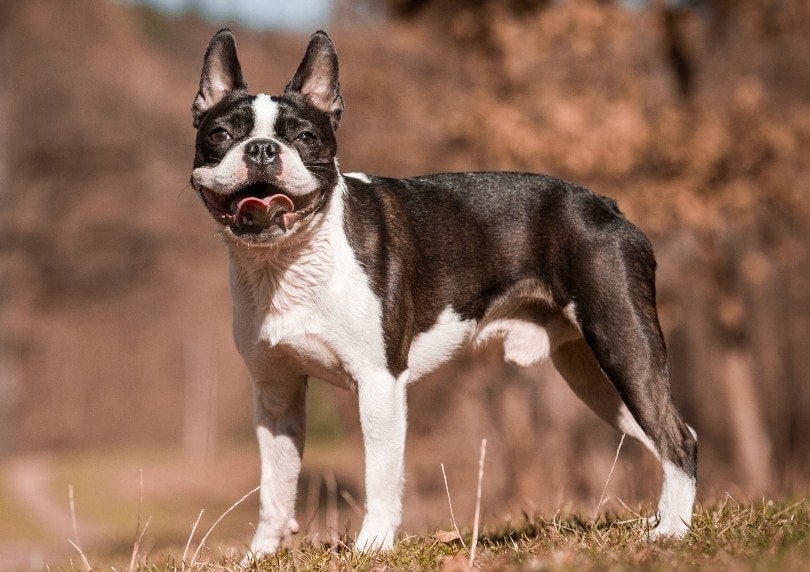German Shorthaired Pointer vs Weimaraner: The Differences (With Pictures)
Updated on
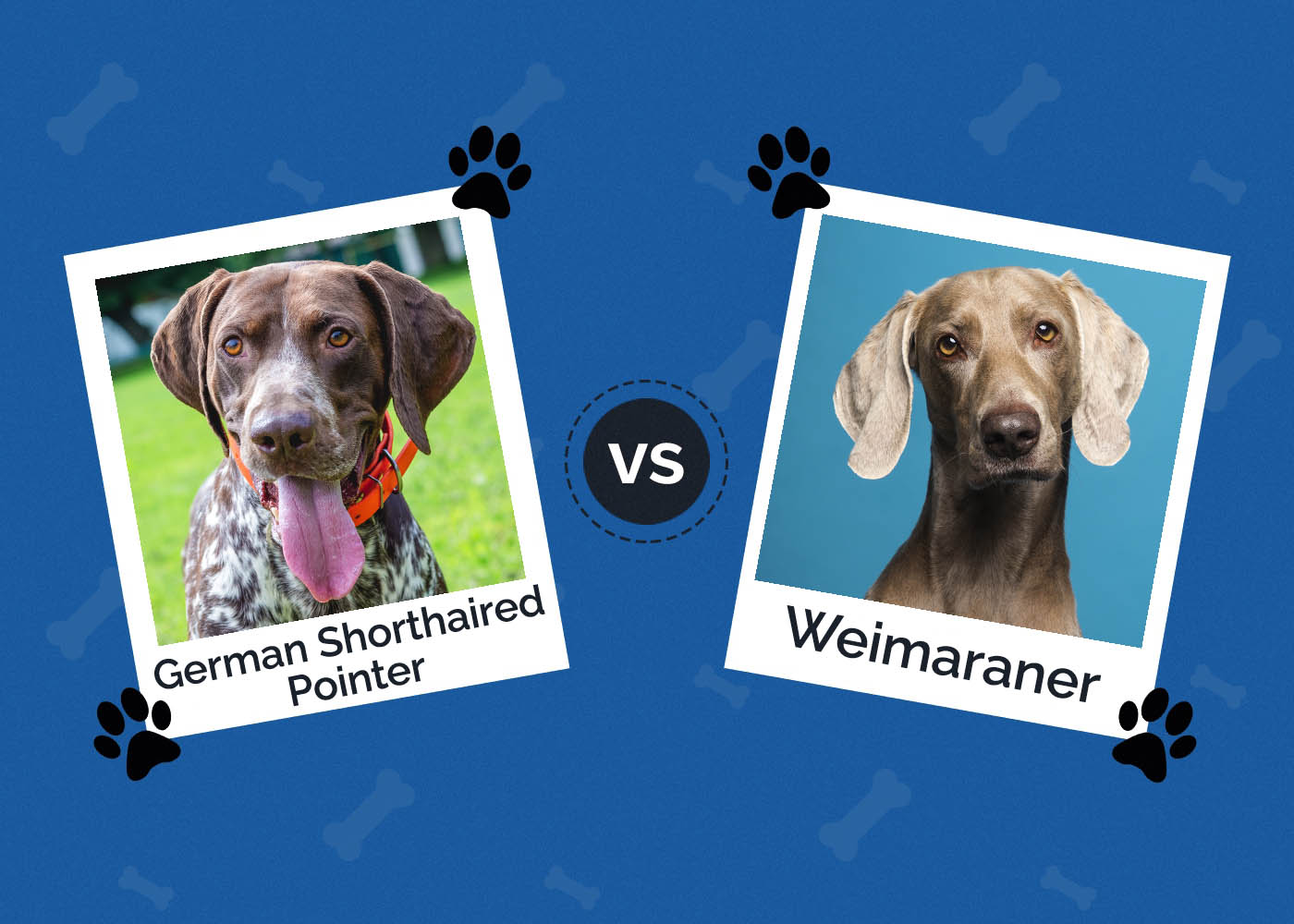
Click to Skip Ahead
Visual Differences
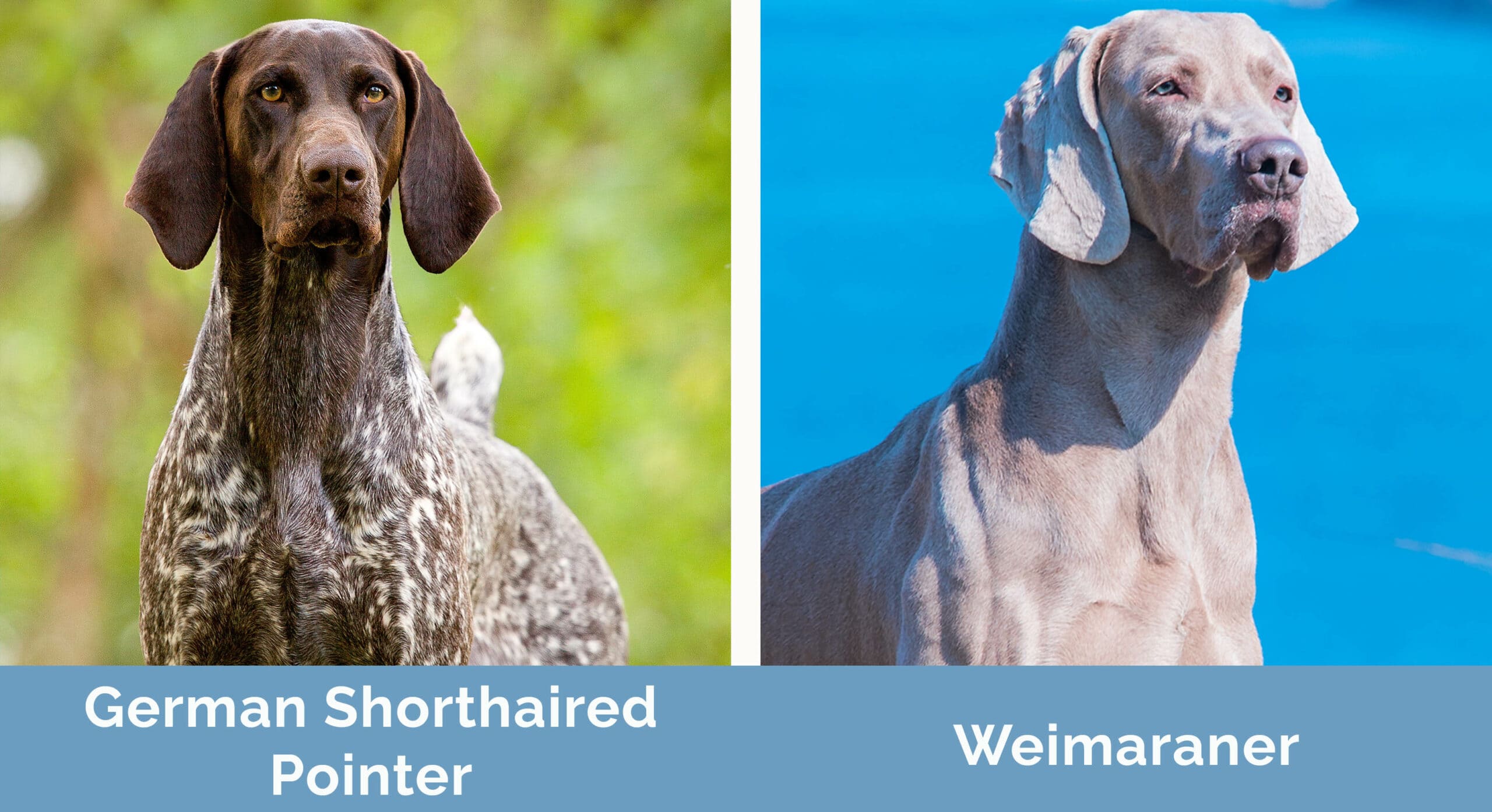
At a Glance
- Average height (adult): Up to 25 inches
- Average weight (adult): 60–70 pounds
- Lifespan: 10–12 years
- Exercise: 1+ hours a day
- Grooming needs: Moderate
- Family-friendly: Yes
- Other pet-friendly: Often with proper socialization
- Trainability: Intelligent, friendly, eager to please
- Average height (adult): Up to 27 inches
- Average weight (adult): 80–90 pounds
- Lifespan: 10–13 years
- Exercise: 1+ hours a day
- Grooming needs: Moderate
- Family-friendly: Yes
- Other pet-friendly: Yes
- Trainability: Intelligent, very loving, loyal, stubborn

German Shorthaired Pointer Overview
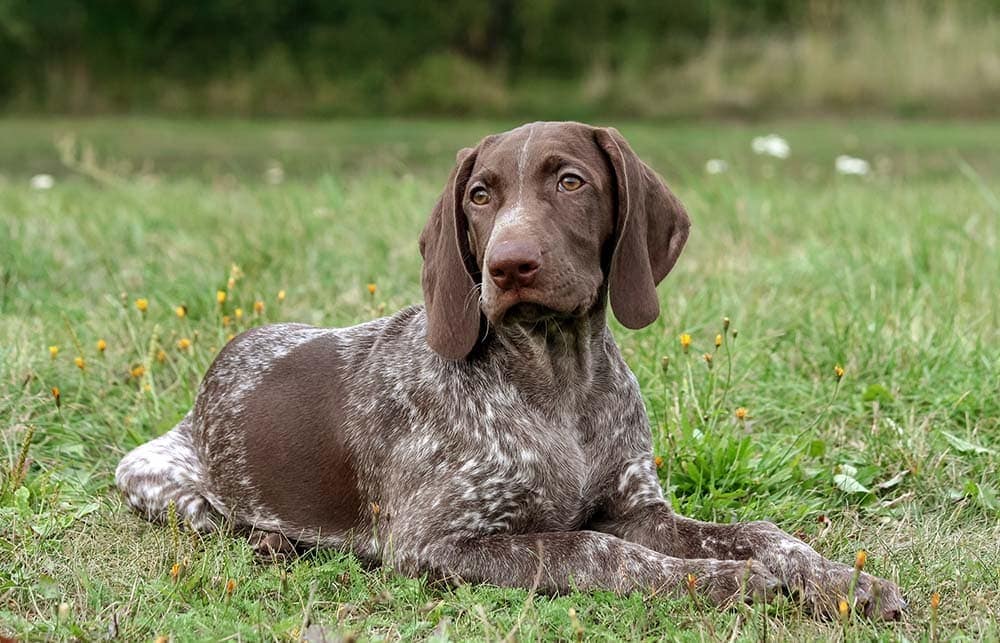
The German Shorthaired Pointer, or GSP, was originally bred to be a top hunting breed. As the name mentions, these dogs were bred in Germany during the 1800s to be a hunting man’s companion. Not only were they bold enough to keep large prey at bay, but they also had great noses and could flush out animals that were hiding. These dogs were also intended to retrieve prey wherever it may fall. That included the water. When not on the hunt, GSPs were used as guard dogs thanks to the loyalty they exhibit toward their families. Today, these dogs may not hunt as much as they used to but that doesn’t mean the same loyal traits and high energy aren’t there. Let’s learn more.
Personality / Character
The German Shorthaired Pointer is an excellent family dog. They love to show affection, enjoy spending time with kids and adults, and have tons of energy. These highly trainable dogs want to be part of all the festivities making them ideal for going on outings and adventures. While the GSP is great with their families, it should be noted that this breed is very wary of strangers and has a high prey drive. Don’t be surprised if they bark or act aloof when approached by someone they don’t know. You’ll also need to socialize these dogs early if you hope to have them in the same house with smaller animals.
The GSP is also very protective of its owners and makes a great guardian dog. They are always on alert. If this breed senses danger, it will immediately let you know. If your GSP is barking and making a ruckus, you should take a look and see if there’s an issue.

Exercise
These lean, muscular dogs need a lot of exercise. They are full of energy that if not utilized can lead to destructive behavior. Hiking, hunting, long walks, and jogging are great activities for these dogs. They also enjoy the water and should exercise at least an hour if not more per day.
Keep in mind, the GSP is a working breed. If you truly want to see them excel, consider canine sports, agility training, and other activities that keep their minds and bodies sharp.
Training
The German Shorthaired Pointer is a very intelligent dog that is eager to please their families. This makes praise training ideal for them, but don’t leave out a few treats here and there. This breed will pick up on commands and tricks quickly, but keep in mind, they are hunting dogs. If they catch an odd scent, they can be easily distracted so it’s up to you to keep them focused. You’ll also want to start training early and include socialization with small animals. With their high prey drive and high energy levels chasing animals isn’t out of the question. You’ll need to work on this if you have cats or other small animals in the area.

Health & Care
The German Shorthaired Pointer is a relatively healthy dog breed with a life expectancy of 10–12 years. To keep up with their active lifestyles, you will need to ensure they are given appropriate amounts of high-quality, high-protein dog food daily. They’ll also need access to clean water. These dogs are seasonal shedders that don’t require lots of grooming. You can brush their coats once or twice a week and bathe as needed to reduce seasonal shedding and keep them looking their best. Remember to keep a check on their ears for cleanliness and signs of infection. Trim their nails as needed or take them to your vet to have this done. You can also brush their teeth daily with a soft-bristled toothbrush and dog-safe toothpaste.
Medical issues that GSPs are prone to include hip and elbow dysplasia, eye issues, hypothyroidism, bloat, and Von Willebrand’s Disease. Adhering to an annual veterinarian schedule is the best way to keep your dog healthy.
Suitable for:
German Shorthaired Pointers are great for anyone who has the energy to keep up with their physical needs. Family settings are great as kids do a good job of keeping these dogs active, but keep in mind, they are large and strong. Small children could easily get knocked down. It may be best to wait until the kiddos are a bit older if you plan on bringing this dog breed into your home.
Weimaraner Overview
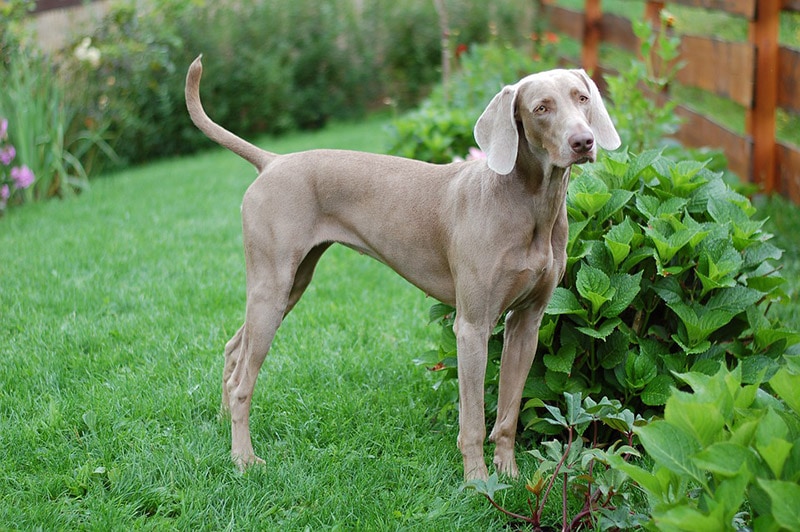
The first Weimaraners were bred in the early part of the 19th century in Germany to help noblemen when they were hunting. The Duke of Weim wanted fast dogs that had great tracking ability, stamina, and courage. Thus, the Weimaraner was born. These dogs had all the qualities these German noblemen wanted so they tried to control the availability of the breed. While the great gray hunting dog was a bit of a legend, that didn’t stop people from joining the German Weimaraner Club in hopes of gaining access to these dogs and potentially breeding them. Thanks to a New England sportsman who joined the club and obtained Weimaraners of his own, the breed was refined and became the dogs we know today.
Personality / Character
The Weimaraner of Weim is quite similar to the GSP in that they are very loving and devoted to their families. They love kids, adults, and even strangers. Weims enjoy time out in the backyard or out on an adventure as long as they are with their people. Their attachment to their families can lead to separation anxiety making it difficult to leave these dogs alone for extended periods. You’ll also find that they are very protective of their families. Unlike the GSP that will bark and alert when danger is near if given the opportunity, Weims will react physically to keep their families safe.
Weimaraners do better with small animals than the German Shorthaired Pointer. In many cases, Weims befriend cats or small dogs as they are very open and friendly dogs. You’ll also find that thanks to their high intelligence levels, these dogs can also work things out, like how to escape the fence or even open doors, so be careful.

Exercise
There isn’t a lot of difference when it comes to the activity levels of the Weimaraner and the GSP. They are both highly energetic and need a lot of exercise. Be prepared for long hikes, walks, and agility sports to keep these dogs happy.
Training
Weims pick up on commands and tricks easily. With how much they want to please their owners, they do great with praise training. However, these dogs need a firm hand. They can be a bit stubborn, and if given the chance, they may take control of the training session. You should also remember that this breed is highly sensitive. If they feel they’ve done wrong or let you down, you’ll visibly see their upset.
Health & Care
Weims don’t require tons of grooming. They have a short coat that sheds seasonally. To avoid loose hairs, give them a thorough brushing once or twice a week and bathe as needed. You’ll also want to stay on top of ear care, nail trimming, and the health of their teeth. High-quality, high-protein dog food is a must to keep up with these active dogs. You’ll want to feed them appropriate amounts daily so they don’t have issues with their weight and ensure they have constant access to fresh, clean water.
Like the GSP, the Weimaraner is a relatively healthy dog breed. Like the GSP they can experience hip and elbow dysplasia, eye issues, and bloat. You’ll also find this breed is more susceptible to skin irritation or infections.
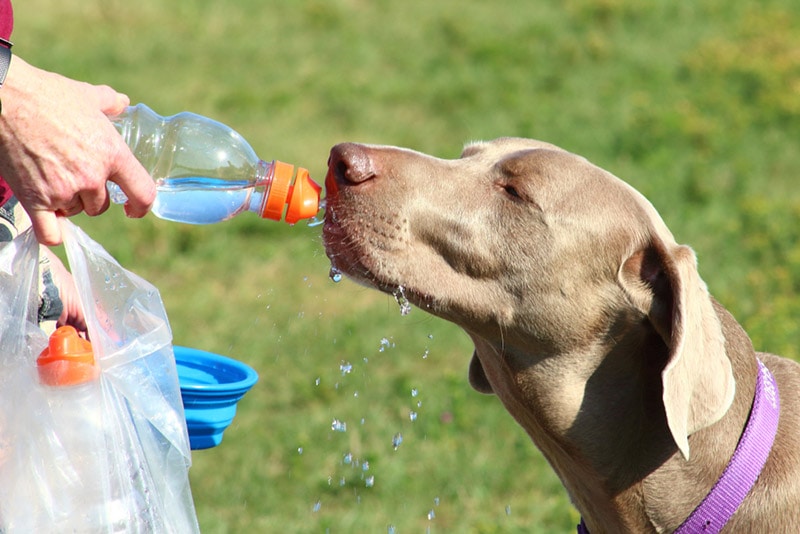
Suitable for:
Weimaraners are great dogs and would do best with a high-energy family that isn’t away too much. These family-oriented dogs want to spend all their time with the ones they love. You should also keep in mind that they do great with other pets but can be highly protective if they feel their family is threatened.
Which Breed Is Right for You?
In all honesty, the biggest difference between these two dog breeds is that the Weimaraner doesn’t like being alone and may suffer from separation anxiety as a result. If you have the energy and time to spend with these active dogs they would be a great fit for any home. Remember, however, they are both large breeds and need lots of room to run and play.
See Also:
- German Wirehaired Pointer vs German Shorthaired Pointer: Differences (With Pictures)
- Wirehaired Pointing Griffon vs German Wirehaired Pointer: Differences (With Pictures)
Featured Image Credit: (L) MVolodymyr, Shutterstock | (R) Leoniek van der Vliet, Shutterstock




